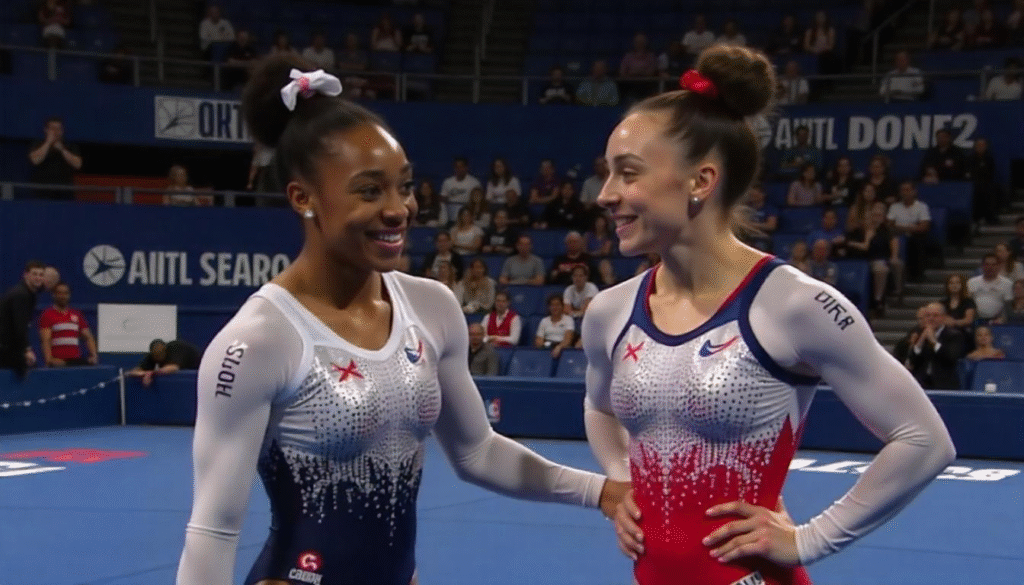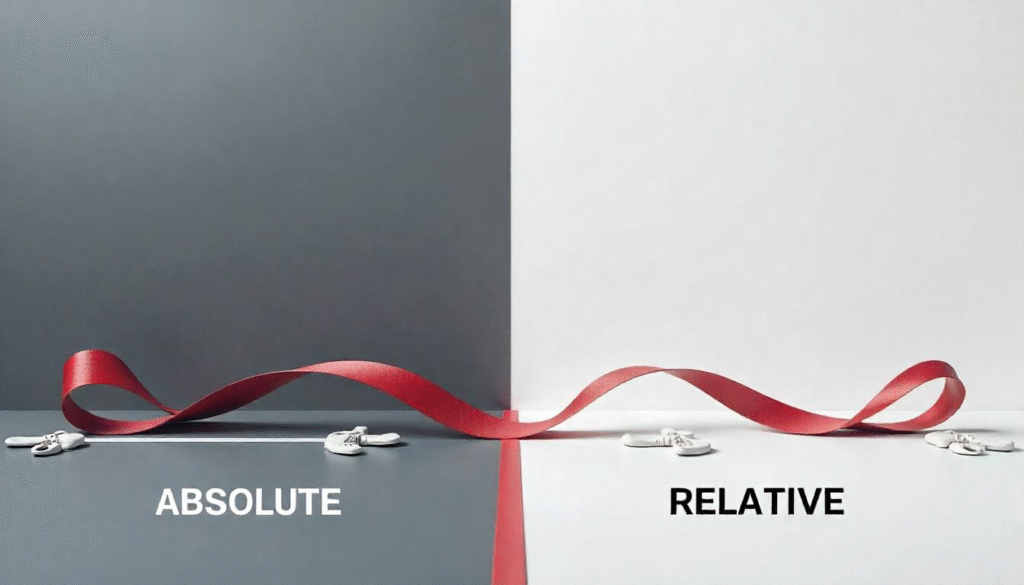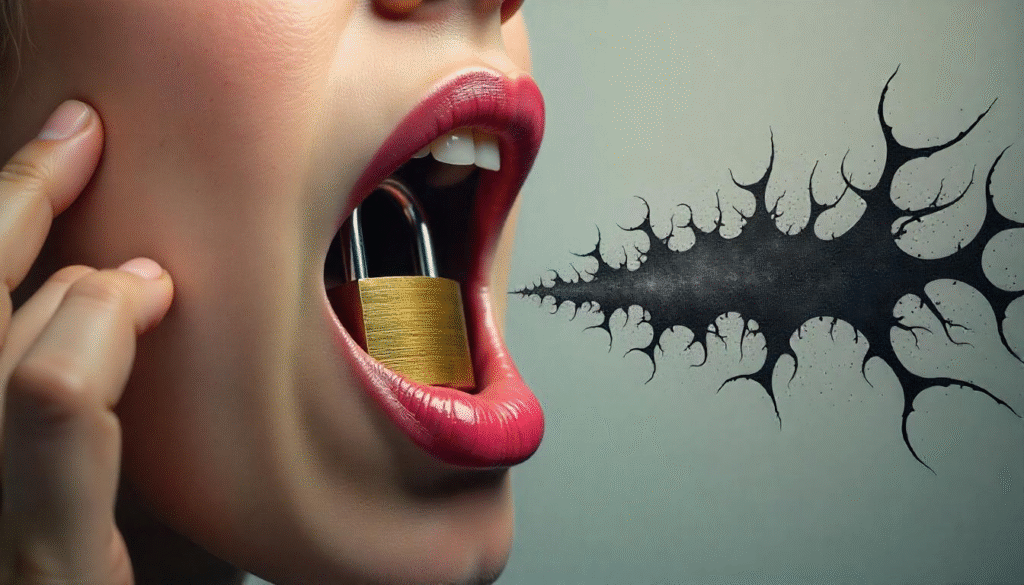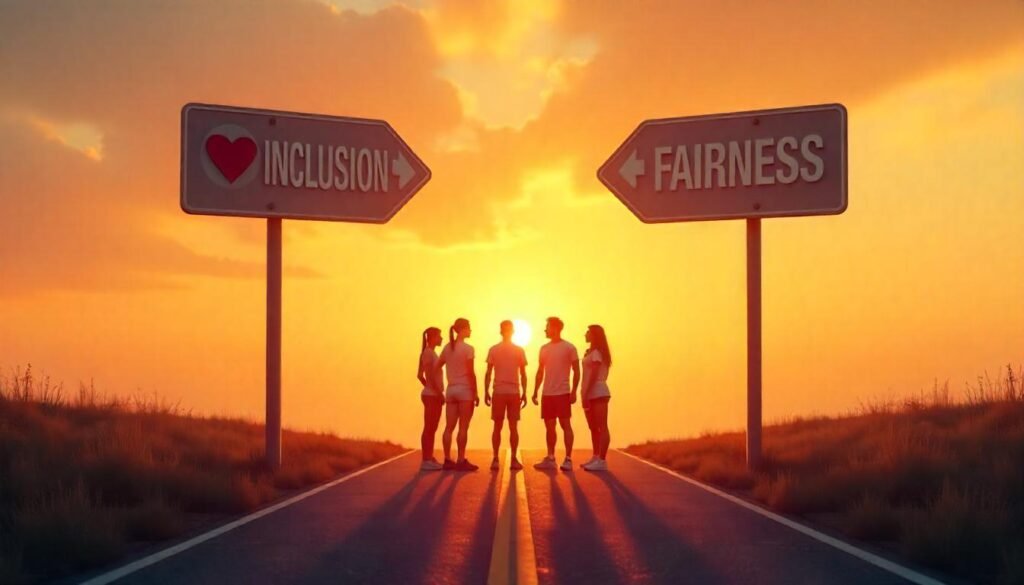Simone Biles vs. Riley Gaines: 5 Ethical Questions on Athlete Activism
Simone Biles vs. Riley Gaines feud forces us to ask 5 difficult ethical questions about modern athlete activism. This analysis moves beyond the headlines to explore the complex moral dilemmas of free speech, power dynamics, and the true meaning of ‘harm’ in the public square.
The Arena of Ideas: Moving Beyond a Simple Feud
The conflict between Simone Biles vs. Riley Gaines is often framed as a simple, two-sided battle over a single issue. However, to view it as such is to miss the profound ethical questions that lie just beneath the surface. This is not just a debate about transgender athletes; it is a case study in the complex responsibilities of modern fame, the weaponization of public platforms, and the very nature of speech in a polarized age. This analysis will move beyond the specific arguments about sports policy to explore the deeper philosophical territory this controversy has exposed. We will examine the power dynamics at play when an established global icon confronts a grassroots activist. We will deconstruct the concept of “harm” and ask whether emotional or psychological harm carries the same weight as the loss of competitive opportunity. And we will explore the fine line every public figure must walk between advocacy and censorship. The Simone Biles vs. Riley Gaines saga is a mirror reflecting our society’s most pressing moral dilemmas, forcing us to consider questions that have no easy answers.
Ethical Question 1: What is the Moral Responsibility of an Athlete’s Platform?
At the heart of this issue is the immense power of an athlete’s platform. Simone Biles, with millions of followers and global adoration, possesses a voice that can shape public opinion in an instant. The ethical question is: what is the moral obligation that comes with such power? One school of thought, which Biles seems to subscribe to, is that a platform must be used to defend the vulnerable and speak out against perceived injustice. In this view, silence is complicity, and using one’s influence to protect marginalized communities like LGBTQ+ athletes is a moral duty. Another school of thought argues that an athlete’s primary responsibility is to their sport and that wading into complex political and social debates can be divisive and damaging. They might argue that a celebrity’s intervention can shut down debate rather than foster it, creating a chilling effect where those with less power, like Riley Gaines at the outset, are afraid to speak for fear of being crushed by a more powerful voice. The Simone Biles vs. Riley Gaines feud perfectly encapsulates this tension between the athlete as an advocate and the athlete as a unifying figure.

Ethical Question 2: How Do We Define ‘Harm’ in Public Discourse?
The entire justification for Simone Biles’ intervention rests on the word “harm.” She, and those who support her, argue that the rhetoric used by Riley Gaines is actively harmful to the transgender community. This forces a critical ethical question: how do we define and weigh different types of harm? The pro-inclusion argument focuses on psychological and emotional harm. They contend that language questioning the identity of transgender women or their right to participate in public life contributes to higher rates of depression, anxiety, and suicide within this vulnerable population. From this perspective, such speech is not merely offensive; it is a public health issue. The harm is intangible but profoundly real. This is a central pillar of the argument in the Simone Biles vs. Riley Gaines debate.
On the other hand, the pro-fairness camp, represented by Gaines, argues for a different definition of harm. They define harm as the tangible loss of opportunities, scholarships, records, and podium places for biological female athletes. They argue that this is a concrete, measurable harm that impacts the lives and careers of hundreds of thousands of girls and women. This perspective asks whether the desire to prevent emotional harm to one group justifies inflicting a tangible, competitive harm on another. This ethical dilemma is incredibly difficult to resolve because it requires us to place two different types of harm on a scale and decide which carries more weight. The Simone Biles vs. Riley Gaines feud is therefore a public trial over which definition of ‘harm’ society should prioritize.

Ethical Question 3: Is ‘Fairness’ Absolute or Relative?
The entire Simone Biles vs. Riley Gaines feud hinges on competing definitions of fairness. This raises a critical philosophical question: is fairness an absolute, universal principle, or is it relative to the specific context? The Riley Gaines camp argues for a form of **absolute, biological fairness** in sports. They believe that the division between male and female categories is a fundamental rule designed to ensure meaningful competition by grouping athletes based on their physiological makeup. From this perspective, allowing exceptions based on gender identity, regardless of the social reasons, is a violation of this absolute principle. It’s a black-and-white issue: the integrity of the category itself is paramount.
Conversely, the side represented by Simone Biles advocates for a more **relative and compassionate fairness**. This view acknowledges that while biological differences exist, the principle of human dignity and the right to inclusion are more important moral goods. They argue that fairness should be assessed relatively, taking into account the immense social disadvantages and discrimination faced by transgender individuals. In this framework, “fairness” is not just about equalizing physical attributes but also about leveling a social playing field that is already heavily tilted against transgender people. This perspective suggests that rigidly adhering to a biological definition of fairness can, in itself, be a form of profound unfairness to a marginalized individual’s life experience. The Simone Biles vs. Riley Gaines conflict is thus a public debate over which of these two philosophical approaches to fairness should govern the world of sport.

Ethical Question 4: Where is the Line Between Advocacy and Silencing?
This question probes the methods used in the Simone Biles vs. Riley Gaines feud. While both women are engaged in advocacy, their approaches raise ethical concerns about the health of public discourse. Simone Biles’ decision to label Gaines’s perspective as “dangerous” is a powerful form of advocacy, but critics argue it borders on silencing dissent. By framing the opposing view as not merely wrong but morally harmful, it can create a chilling effect, discouraging others with similar questions from speaking up for fear of being similarly labeled and publicly condemned by a figure with immense cultural power. This tactic, while effective for mobilizing a base, can lead to a less tolerant public square where complex issues cannot be debated openly. It raises the question: does a powerful advocate have a responsibility to engage with opposing arguments, or is it their right to simply condemn them?
Conversely, the movement represented by Riley Gaines faces its own ethical line. While advocating for their perspective, some supporters of the “Save Women’s Sports” movement have been accused of using language that invalidates the identity of transgender people, sometimes refusing to use correct pronouns or questioning their existence. This approach, while galvanizing to their supporters, is seen by opponents as an act of dehumanization. It shifts the debate from a disagreement over sports policy to a denial of a person’s identity. The ethical challenge for this side is how to advocate for biological categories in sports without contributing to a climate of hostility and discrimination against the transgender community as a whole. The Simone Biles vs. Riley Gaines feud, therefore, forces both sides to confront the ethical limits of their own advocacy.

Ethical Question 5 & The Definitive FAQ
The final ethical question serves as a summary of the entire conflict: in a world of conflicting rights and deeply held beliefs, what is the path forward? The Simone Biles vs. Riley Gaines feud demonstrates that there are no easy answers. A solution that fully satisfies one side will likely be seen as a grave injustice by the other. The path forward may not be about finding a single “correct” answer, but about creating systems and structures that can manage these disagreements without dehumanizing either side. This requires a commitment to open dialogue, a reliance on evolving scientific data, and a willingness to explore innovative solutions like new competitive categories. Below, we address the most common questions surrounding this feud, providing detailed answers that reflect the ethical complexities discussed throughout this article.
5.1 What is the core ethical dilemma in the Simone Biles vs. Riley Gaines feud?
The core ethical dilemma is a conflict between two competing moral goods: the principle of **inclusive justice** for transgender individuals versus the principle of **competitive fairness** for biological female athletes. The side represented by Simone Biles argues from a standpoint of social justice, positing that it is ethically imperative to include marginalized individuals in all aspects of society, including sport, and that speech questioning this inclusion causes real-world harm. The side represented by Riley Gaines argues from a standpoint of fairness in sport, positing that the biological advantages of male puberty create an inherently unfair competitive environment, and that protecting the women’s category is an ethical imperative to preserve meaningful opportunities for female athletes. The dilemma forces us to ask which “good” should take precedence when they appear to be in direct conflict.
5.2 Does an athlete’s “right to speak” include the right to label others as harmful?
This is a central question of free speech ethics raised by the Simone Biles vs. Riley Gaines feud. While free speech is a foundational principle, it is not without ethical considerations. When a powerful figure like Simone Biles uses her platform to label another’s viewpoint as “dangerous,” she is exercising her right to speak. However, critics argue this crosses a line from debating an idea to de-platforming a person, potentially inciting online harassment and silencing a necessary, albeit difficult, public conversation. The ethical question is not about legality, but responsibility: does a person with a massive platform have a higher ethical duty to foster dialogue rather than simply condemn opposing views?
5.3 Is it ethically possible to support women’s sports and trans rights simultaneously?
Many people find themselves caught in the middle of the Simone Biles vs. Riley Gaines debate, wishing to support both principles. Ethically, this is possible, but it requires embracing nuance and rejecting the polarized framing of the issue. A common middle-ground position argues for a solution that provides a dedicated, protected category for biological female athletes to ensure competitive fairness, while simultaneously creating new, inclusive categories (like an “Open” category) where transgender athletes can compete with dignity and respect. This approach attempts to honor both the biological realities relevant to sport and the human rights of transgender individuals, suggesting that fairness and inclusion are not mutually exclusive if we are willing to innovate our competitive structures.
5.4 What is the ethical responsibility of sports governing bodies like the IOC?
The ethical responsibility of sports governing bodies is immense and complex. They have a duty of care to *all* athletes. This includes ensuring a safe and inclusive environment for transgender athletes, as well as ensuring a fair and meaningful competitive environment for female athletes. The Simone Biles vs. Riley Gaines feud has highlighted the failure of many organizations to create clear, evidence-based, and predictable policies. Their ethical imperative now is to move beyond reactive and politically influenced decisions and engage in a transparent process that involves consulting with scientists, ethicists, and athletes from all sides of the debate to create a stable and just framework for the future.
5.5 How should the public ethically engage with this debate?
The Simone Biles vs. Riley Gaines feud offers a powerful lesson in public discourse. An ethical engagement requires moving away from tribalism and ad hominem attacks. It involves listening to the core arguments of both sides: acknowledging the legitimate concerns of female athletes about fair competition, while also acknowledging the legitimate desire of transgender individuals for inclusion and respect. It requires a commitment to debating the policy, not dehumanizing the people involved. Ethically, the public’s role is to demand nuance from media and leaders, and to foster a conversation that can lead to a solution rather than simply deepening the cultural divide.






Post Comment